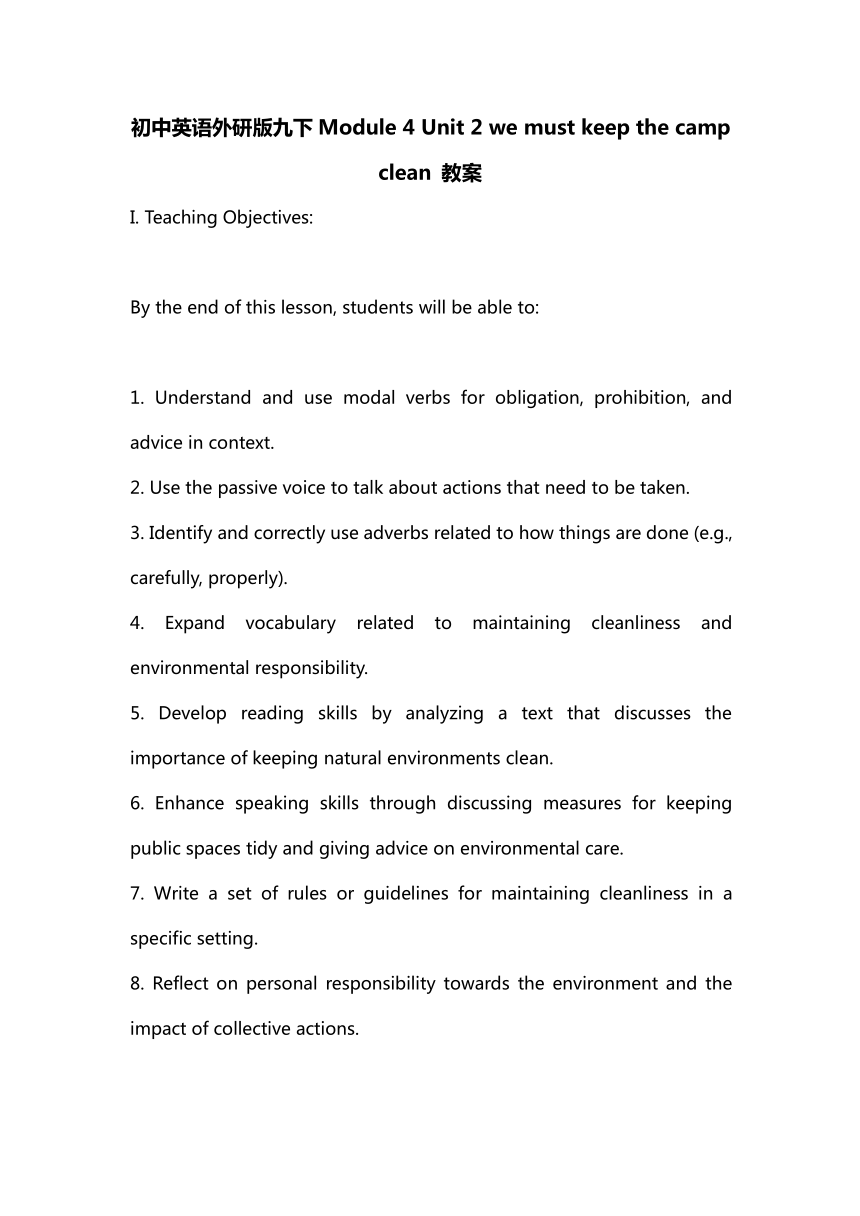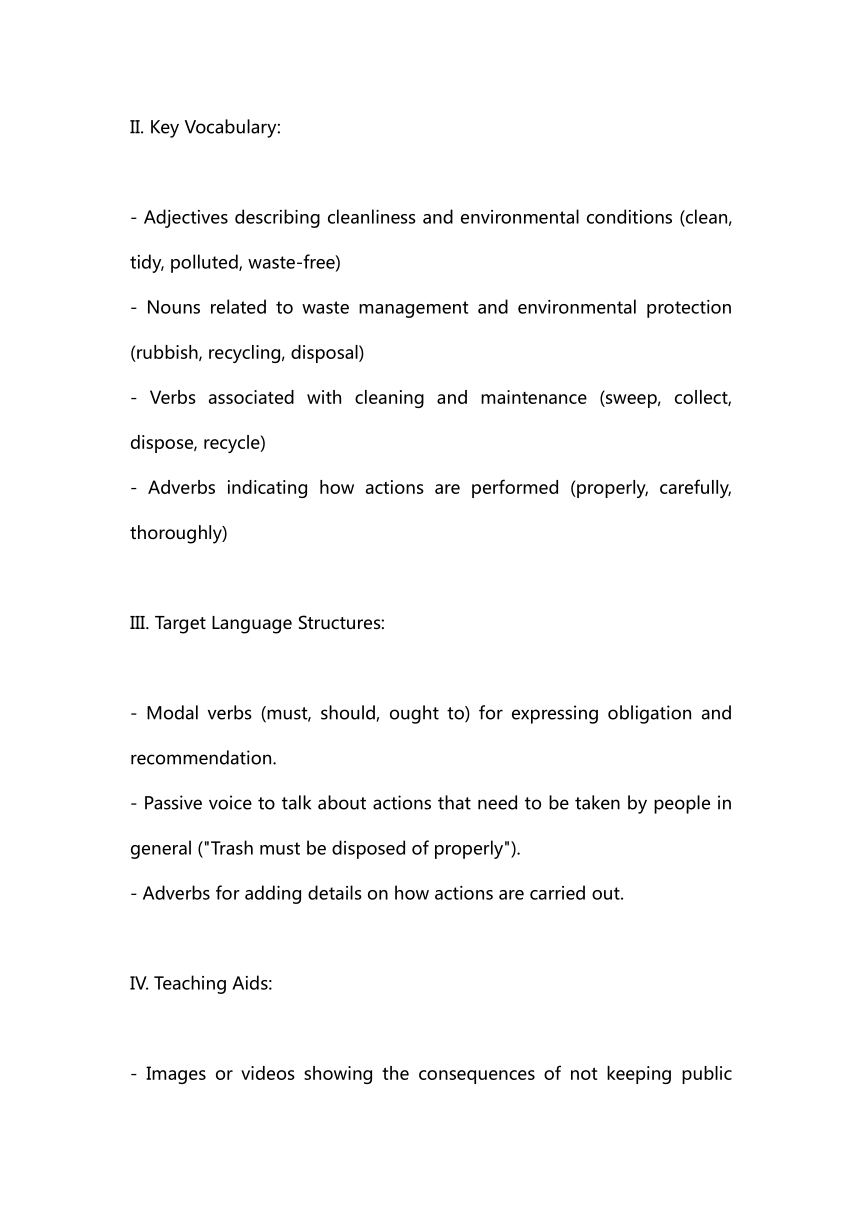外研版九年级下册Module 4 Unit 2 we must keep the camp clean 教案
文档属性
| 名称 | 外研版九年级下册Module 4 Unit 2 we must keep the camp clean 教案 |

|
|
| 格式 | docx | ||
| 文件大小 | 13.4KB | ||
| 资源类型 | 教案 | ||
| 版本资源 | 外研版 | ||
| 科目 | 英语 | ||
| 更新时间 | 2024-02-26 07:52:28 | ||
图片预览


文档简介
初中英语外研版九下Module 4 Unit 2 we must keep the camp clean 教案
I. Teaching Objectives:
By the end of this lesson, students will be able to:
1. Understand and use modal verbs for obligation, prohibition, and advice in context.
2. Use the passive voice to talk about actions that need to be taken.
3. Identify and correctly use adverbs related to how things are done (e.g., carefully, properly).
4. Expand vocabulary related to maintaining cleanliness and environmental responsibility.
5. Develop reading skills by analyzing a text that discusses the importance of keeping natural environments clean.
6. Enhance speaking skills through discussing measures for keeping public spaces tidy and giving advice on environmental care.
7. Write a set of rules or guidelines for maintaining cleanliness in a specific setting.
8. Reflect on personal responsibility towards the environment and the impact of collective actions.
II. Key Vocabulary:
- Adjectives describing cleanliness and environmental conditions (clean, tidy, polluted, waste-free)
- Nouns related to waste management and environmental protection (rubbish, recycling, disposal)
- Verbs associated with cleaning and maintenance (sweep, collect, dispose, recycle)
- Adverbs indicating how actions are performed (properly, carefully, thoroughly)
III. Target Language Structures:
- Modal verbs (must, should, ought to) for expressing obligation and recommendation.
- Passive voice to talk about actions that need to be taken by people in general ("Trash must be disposed of properly").
- Adverbs for adding details on how actions are carried out.
IV. Teaching Aids:
- Images or videos showing the consequences of not keeping public spaces clean.
- Whiteboard and markers for grammar explanation and writing key sentences.
- Audio material featuring dialogues or discussions about cleanliness and environmental care.
- Handouts with exercises on modal verbs, passive voice, adverbs, new vocabulary, and a writing prompt for creating cleanliness guidelines.
V. Teaching Procedures:
Step 1: Warm-up (5 minutes)
- Begin with a quick discussion about the importance of cleanliness in everyday life and the consequences of neglecting it.
- Elicit key vocabulary from students and write it on the board.
Step 2: Listening (10 minutes)
- Play an audio track that presents scenarios where cleanliness is crucial for health and safety.
- After listening, ask comprehension questions to check understanding of the content.
Step 3: Speaking Practice (15 minutes)
- Students work in pairs or small groups to discuss ways they can contribute to keeping their school, community, or campground clean.
- Conduct a class activity where each group shares their ideas and creates a list of suggestions for a clean environment.
Step 4: Grammar Focus (10 minutes)
- Review the usage of modal verbs for expressing obligation and recommendations.
- Introduce and practice the passive voice used for talking about general actions that need to be taken.
- Review the use of adverbs to describe how actions are performed.
Step 5: Reading (10 minutes)
- Distribute a text discussing the importance of keeping natural environments clean, guiding students through it to identify target language structures and new vocabulary.
- Ask students to summarize the main points and suggest additional measures for cleanliness.
Step 6: Writing Task (10 minutes)
- Hand out worksheets with exercises on constructing sentences using modal verbs, passive voice, and adverbs.
- Assign a written task where students draft a set of guidelines for maintaining cleanliness in a specified setting, based on their own experience or imagination.
Step 7: Homework & Review (5 minutes)
- Assign homework for students to complete their guidelines for cleanliness, incorporating feedback from the writing task.
- Review key points from the lesson through a quick quiz or verbal questioning.
VI. Assessment:
- Evaluate students based on their participation in speaking activities, correct usage of modal verbs, passive voice, and adverbs in oral and written assignments, and completion of homework tasks.
- Assess listening skills through comprehension questions related to the audio content about cleanliness scenarios.
- Assess reading comprehension through a short quiz targeting the main points and details of the provided text about environmental cleanliness.
- Review the ability to express obligation and recommendations using the learned language structures and vocabulary
I. Teaching Objectives:
By the end of this lesson, students will be able to:
1. Understand and use modal verbs for obligation, prohibition, and advice in context.
2. Use the passive voice to talk about actions that need to be taken.
3. Identify and correctly use adverbs related to how things are done (e.g., carefully, properly).
4. Expand vocabulary related to maintaining cleanliness and environmental responsibility.
5. Develop reading skills by analyzing a text that discusses the importance of keeping natural environments clean.
6. Enhance speaking skills through discussing measures for keeping public spaces tidy and giving advice on environmental care.
7. Write a set of rules or guidelines for maintaining cleanliness in a specific setting.
8. Reflect on personal responsibility towards the environment and the impact of collective actions.
II. Key Vocabulary:
- Adjectives describing cleanliness and environmental conditions (clean, tidy, polluted, waste-free)
- Nouns related to waste management and environmental protection (rubbish, recycling, disposal)
- Verbs associated with cleaning and maintenance (sweep, collect, dispose, recycle)
- Adverbs indicating how actions are performed (properly, carefully, thoroughly)
III. Target Language Structures:
- Modal verbs (must, should, ought to) for expressing obligation and recommendation.
- Passive voice to talk about actions that need to be taken by people in general ("Trash must be disposed of properly").
- Adverbs for adding details on how actions are carried out.
IV. Teaching Aids:
- Images or videos showing the consequences of not keeping public spaces clean.
- Whiteboard and markers for grammar explanation and writing key sentences.
- Audio material featuring dialogues or discussions about cleanliness and environmental care.
- Handouts with exercises on modal verbs, passive voice, adverbs, new vocabulary, and a writing prompt for creating cleanliness guidelines.
V. Teaching Procedures:
Step 1: Warm-up (5 minutes)
- Begin with a quick discussion about the importance of cleanliness in everyday life and the consequences of neglecting it.
- Elicit key vocabulary from students and write it on the board.
Step 2: Listening (10 minutes)
- Play an audio track that presents scenarios where cleanliness is crucial for health and safety.
- After listening, ask comprehension questions to check understanding of the content.
Step 3: Speaking Practice (15 minutes)
- Students work in pairs or small groups to discuss ways they can contribute to keeping their school, community, or campground clean.
- Conduct a class activity where each group shares their ideas and creates a list of suggestions for a clean environment.
Step 4: Grammar Focus (10 minutes)
- Review the usage of modal verbs for expressing obligation and recommendations.
- Introduce and practice the passive voice used for talking about general actions that need to be taken.
- Review the use of adverbs to describe how actions are performed.
Step 5: Reading (10 minutes)
- Distribute a text discussing the importance of keeping natural environments clean, guiding students through it to identify target language structures and new vocabulary.
- Ask students to summarize the main points and suggest additional measures for cleanliness.
Step 6: Writing Task (10 minutes)
- Hand out worksheets with exercises on constructing sentences using modal verbs, passive voice, and adverbs.
- Assign a written task where students draft a set of guidelines for maintaining cleanliness in a specified setting, based on their own experience or imagination.
Step 7: Homework & Review (5 minutes)
- Assign homework for students to complete their guidelines for cleanliness, incorporating feedback from the writing task.
- Review key points from the lesson through a quick quiz or verbal questioning.
VI. Assessment:
- Evaluate students based on their participation in speaking activities, correct usage of modal verbs, passive voice, and adverbs in oral and written assignments, and completion of homework tasks.
- Assess listening skills through comprehension questions related to the audio content about cleanliness scenarios.
- Assess reading comprehension through a short quiz targeting the main points and details of the provided text about environmental cleanliness.
- Review the ability to express obligation and recommendations using the learned language structures and vocabulary
同课章节目录
- Module 1 Travel
- Unit 1 We toured the city by bus and by taxi
- Unit 2 It's a long story.
- Unit 3 Language in use
- Module 2 Education
- Unit 1 They don't sit in rows.
- Unit 2 What do I like best about school?
- Unit 3 Language in use
- Module 3 Life now and then
- Unit 1 They sometimes work harder.
- Unit 2 I think life is better today.
- Unit 3 Language in use.
- Module 4 Rules and suggestions
- Unit 1 You must be careful of falling stones.
- Unit 2 we must keep the camp clean.
- Unit 3 Language in use.
- Revison A
- Module 5 Look after yourself
- Unit 1 We'd better get you to hospital.
- Unit 2 Get off the sofa!
- Unit 3 Language in use.
- Module 6 Eating togethe
- Unit 1 When is the school-leavers' party?
- Unit 2 Knives and forks are used for most Western
- Unit 3 Language in use
- Module 7 English for you and me
- Unit 1 Have you ever been to an English corner?
- Unit 2 We all own English.
- Unit 3 Language in use
- Module 8 My future life
- Unit 1 Here's to our friendship and the future
- Unit 2 I know that you will be better at maths.
- Unit 3 Language in use
- Revison B
